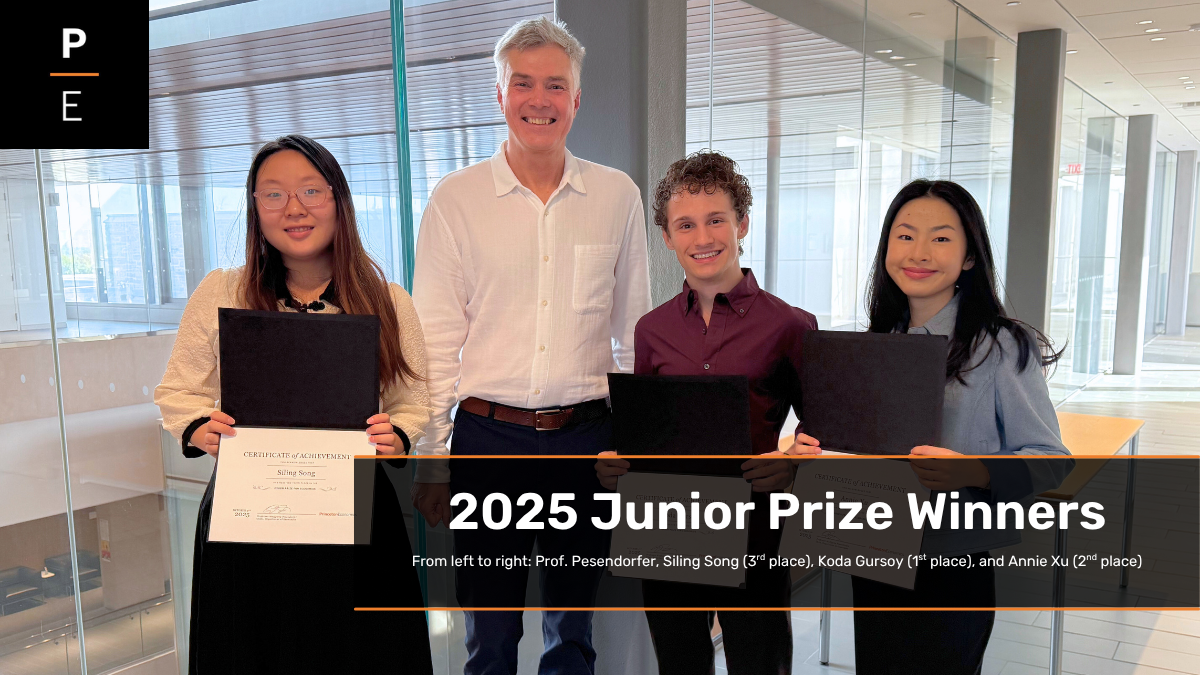2025 Junior Prizes for outstanding research and economics coursework
The Economics Department at Princeton is celebrating three students as recipients of this year’s Junior Prizes: Koda Gursoy (1st place), Annie Xu (2nd place), and Siling Song (3rd place).

Each year, the Princeton Economics Department awards the prestigious Junior Prizes to select seniors in recognition of their high GPA and outstanding junior independent work (JIW).
1st-place winner Koda Gursoy explored theoretical questions in his junior paper.
Koda Gursoy’s paper, titled “Can Policies Regulating Information Acquisition Alleviate Statistical Discrimination?” adapts a model of statistical discrimination in worker hiring created by Coate and Loury (1993). Gursoy shared that he chose this topic because “the Coate-Loury paper was the first economics paper I ever read, and was the reason that I decided I wanted to be an economist, so it was always a goal of mine to contribute to that same literature.”
Gursoy’s research process involved a significant time commitment to surveying the statistical discrimination literature to see the scope of models that had already been studied. “What stuck out to me was that all of the models took the information structure by which employers assess workers as given, so I wanted to relax that assumption and see what the effects were.”
Certain proofs turned out to be quite challenging, Gursoy shared, specifically as he determined which technical assumptions to apply to the model to make these proofs possible. Throughout the project, Gursoy found working with his adviser, Professor Adam Kapor, as well as Professors Faruk Gul and Xiaosheng Mu, highly beneficial as he worked to overcome the challenges his theoretical project presented.
Gursoy said the paper “solidified my love for microeconomic theory.” He plans to become a professor of economics in this subfield. “It gave me the confidence to continue on this path, which in the immediate future continues with another theory project for my thesis!”
Advice for other student researchers
Now in their senior year, this year’s Junior Prize winners shared some advice for students at the beginning of the independent research process.
Annie Xu, whose paper is titled “Political Uncertainty and Options-Implied Risks,“ became interested in the intersection of macroeconomics and finance after taking a series of graduate-level finance courses, which introduced her to foundational ideas in asset pricing. “Within the field of macro-finance, political uncertainty was front and center in headlines and market narratives last year amid a wave of global elections, and I wanted to see how those shifts in sentiment were reflected in market behavior.”
When choosing her topic, Xu said she decided to explore this question because it “felt topical and well-anchored, allowing me to connect real-world events to measurable movements in financial data.” Her adviser, Professor Moritz Lenel, provided essential feedback as she chose her topic and throughout the process.
Sharing her advice for students working on their JIWs, Xu said, “At the beginning of any research project, it can feel daunting, as though every question has already been answered by established scholarship. Yet that’s far from true.“ She recommends that students “read widely and write often; articulating your thoughts and understanding of the literature helps reveal connections you might otherwise miss, whether through new data and methods, or a fresh perspective on familiar ideas. Even at the undergraduate level, it’s entirely possible to make meaningful contributions by asking small but sharply focused questions.”
As she looks beyond Princeton, Xu is excited to build on this research and hopes to “apply these perspectives to real-world market behavior and decision-making.”
Siling Song, whose paper is titled “Cramming for Success: How does participation in shadow education in high school affect students’ college admission, first job placement, and adulthood life satisfaction in South Korea?“ became interested in investigating the actual return to shadow or supplementary education after the enactment of the “double reduction policy“ in China.
Song encountered challenges while working on her JIW, including finding the right estimation strategy given her data constraints. “I’m really grateful to my adviser, Professor Zach Bleemer, for giving me incredibly helpful advice on ways to improve my models and potential alternative estimation strategies to consider,“ said Song.
For first- and second-year students interested in economics, Song recommends, “besides courses directly relevant to your field of interest, I think it would also be great if you could take econometric courses earlier, ideally before the start of your JIW projects. Both ECO312 and ECO313 were incredibly informative for my JIW. If I could go back in time, I would try to take both of these courses before my junior year.“ She believes these courses provide an ideal foundation for students as they begin working on their JIW.
“This project really deepened my interest in labor economics,“ said Song. “Now my senior thesis is also related to this topic.“ The work she completed for her JIW helped Song solidify her interests, which in turn impacted her future goals.
First-place winner Gursoy encouraged juniors to utilize the incredible resources that their advisers and other professors provide. Their experience and advice can make all the difference in the success of one’s paper.
“Since my project was theoretical, it was quite ambitious by nature, so it was really easy to stumble into directions that would have been entirely impossible to successfully complete in the JIW timeframe. Liberally scheduling office hours with my adviser to check in and make sure I was moving in feasible directions was super helpful in keeping myself on track.”
For more advice, information, or resources on Junior Papers, visit the Junior Independent Work (JIW) page on the Economics Department website.